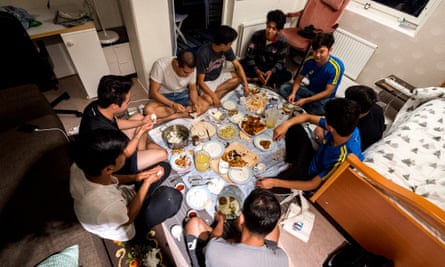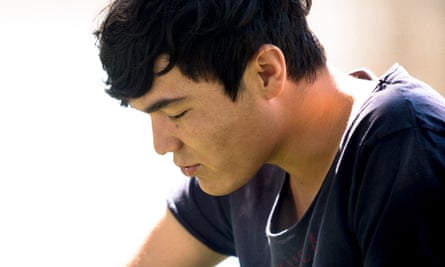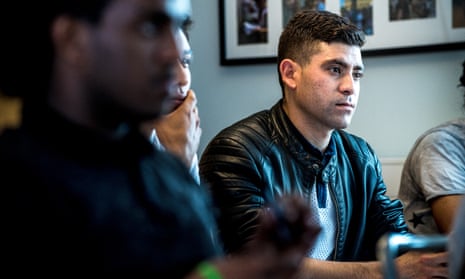A smell of spicy chicken wafts from a communal kitchen. In a neighbouring room, a dozen or so boys sit on the floor around dishes and several steaming teapots. The chatter is jovial enough, a mix of Dari, Swedish and English.
The teenagers are all Afghans living in a camp for minors in Floda, 25 miles east of Gothenburg. But for how much longer?
“We left Afghanistan because we were in danger,” said Mostafa, 17, several friends nodding in agreement. “Things would be even worse if we returned. The Taliban would ask us why we left for Europe.”
This nightmare scenario is edging closer for the Afghan boys. The country that welcomed them along with 35,000 other unaccompanied minors from across the globe during the extraordinary year of 2015, has had a change of heart.
Statistics suggest that Mostafa is likely to receive a one-way ticket back to Afghanistan. Although Afghans represent more than half of refugees that landed in Sweden, only 28% were granted asylum by the immigration authorities in 2016, compared with 91% of Syrian applicants.
The Scandinavian country is far from the only one sending Afghans home. Ever since the European Union declared there were “safe zones” in Afghanistan and concluded an agreement with its government in October 2016 to send refugees home, they have been considered fair game.
Britain, Norway, the Netherlands, Croatia, Macedonia, Serbia, France and Germany have also deported Afghan refugees or offered them financial incentives to leave voluntarily. Pakistan and Iran, both of which house numerous Afghan refugees, have been particularly aggressive in deporting them.

“I am not here by choice,” said Mostafa. “If there were no war in Afghanistan I’d prefer to be back there. It’s my country. But now I am happy here.”
Mostafa said he was schooled by the Taliban in Helmand, but that after he realised they wanted to use him as a human bomb, he ran away. He crossed several countries, mountains and lakes, alone, mostly on foot, pockets empty, when he was 15, before finding refuge in Sweden four months later.
Now he and his friends endure sleepless nights as they wait for their asylum cases to be heard. “The kids at school who received negative responses to their asylum requests are depressed,” said Mostafa.
Later, in a Gothenburg park, he introduces two of them.

Nasrat is also 17 but still has the face of a child. Ali is 19 and sports a fashionable haircut. “Our parents were killed by the Taliban,” said Nasrat softly in English. Both are Hazaras, one of Afghanistan’s most persecuted minorities. Nevertheless, both recently received expulsion notices from the Swedish authorities which they quickly challenged.
“We have the right to ask three times for a review of the immigration decision, but after three refusals, we are arrested and put on a plane,” said Nasrat.
Ali knows that his chances of staying are slimmer because of his age. “I was told that I could go back to Afghanistan because I am over 18, that I could go live alone in Kabul,” he said.
Ali was a minor when he arrived in Sweden. But the average time to process an asylum request for Afghans who received decisions in 2017 was 538 days, so his case is now treated as that of an adult. This comes during a time when asylum requests by minors are increasingly being accepted.
Six other young Afghans, friends of Mostafa, approach our small group. “They too have all had their asylum claims turned down,” he said.

Moji is the first of the newcomers to speak. The young man received his deportation order a month ago. But Moji has had never even been in Afghanistan. His Hazara parents took refuge in Iran before he was born. Since Moji’s family is undocumented, he is regarded as Afghan.
“My teachers criticise me for my falling grades and for not coming to class,” he said. “But I can’t concentrate. All I can think about is that plane flight back to Afghanistan.”
Nasrat added: “I have too many nightmares. The others as well. A few months ago, five young Afghan refugees in Sweden, including one of our friends, killed themselves after receiving their deportation notices.” The group then tell of two other Afghan refugees who recently plunged to their deaths at an adjacent canal.
The United Nations high commissioner for refugees has expressed alarm at the growing European trend for returning Afghans.
“The overall humanitarian and security situation in Afghanistan has deteriorated during the past year and a half,” said Caroline Bach, a spokesperson for the UNHCR. “We are also highly concerned about targeted violence against children in Afghanistan, including sexual violence, the recruitment of child soldiers, and attacks on schools which have recently sharply increased in number.” Last year a third of civilian casualties of the Afghan conflict were children, according to UN figures. In 2015 it was one in four.
“Several studies show that these refugee children were traumatised by experiences prior to leaving Afghanistan, during their trips to Europe and by the lengthy asylum processes,” said Bach. “However there are no adequate facilities in Afghanistan to support their fragile mental health and psychosocial needs.”
Another spokesperson for the UNHCR added: “These factors need to be taken into account when assessing asylum requests. Asylum [eligibility] should be determined on a case-by-case basis, based on real needs, and not by profiling applicants’ nationalities.”
Back in Sweden, Moji said: “The Swedish government is not that different than the Taliban. “The Taliban kill us. Sweden sends us to be killed.”
The UNHCR goes even further: if safe countries refuse to welcome them and offer them help, “that equates to condemning them to death”, it said.
Translation: Peter Diekmeyer
